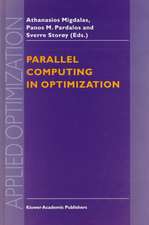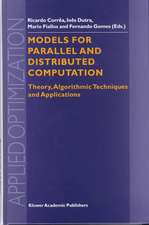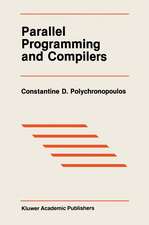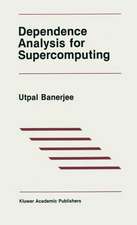Multiscalar Processors: The Springer International Series in Engineering and Computer Science, cartea 718
Autor Manoj Franklinen Limba Engleză Paperback – 31 oct 2012
| Toate formatele și edițiile | Preț | Express |
|---|---|---|
| Paperback (1) | 643.63 lei 6-8 săpt. | |
| Springer Us – 31 oct 2012 | 643.63 lei 6-8 săpt. | |
| Hardback (1) | 650.92 lei 6-8 săpt. | |
| Springer Us – 31 dec 2002 | 650.92 lei 6-8 săpt. |
Din seria The Springer International Series in Engineering and Computer Science
- 24%
 Preț: 1041.98 lei
Preț: 1041.98 lei - 20%
 Preț: 643.50 lei
Preț: 643.50 lei - 18%
 Preț: 1225.62 lei
Preț: 1225.62 lei - 18%
 Preț: 965.02 lei
Preț: 965.02 lei - 20%
 Preț: 646.12 lei
Preț: 646.12 lei - 18%
 Preț: 948.79 lei
Preț: 948.79 lei - 20%
 Preț: 646.62 lei
Preț: 646.62 lei - 15%
 Preț: 637.46 lei
Preț: 637.46 lei - 20%
 Preț: 643.83 lei
Preț: 643.83 lei - 18%
 Preț: 949.23 lei
Preț: 949.23 lei - 20%
 Preț: 644.48 lei
Preț: 644.48 lei - 20%
 Preț: 994.92 lei
Preț: 994.92 lei - 20%
 Preț: 645.97 lei
Preț: 645.97 lei - 18%
 Preț: 946.87 lei
Preț: 946.87 lei - 20%
 Preț: 995.57 lei
Preț: 995.57 lei - 18%
 Preț: 956.99 lei
Preț: 956.99 lei - 20%
 Preț: 644.98 lei
Preț: 644.98 lei - 15%
 Preț: 649.54 lei
Preț: 649.54 lei - 18%
 Preț: 950.21 lei
Preț: 950.21 lei - 18%
 Preț: 1221.38 lei
Preț: 1221.38 lei - 18%
 Preț: 957.62 lei
Preț: 957.62 lei - 15%
 Preț: 643.99 lei
Preț: 643.99 lei - 18%
 Preț: 948.47 lei
Preț: 948.47 lei - 18%
 Preț: 947.35 lei
Preț: 947.35 lei - 20%
 Preț: 1284.65 lei
Preț: 1284.65 lei - 20%
 Preț: 1628.31 lei
Preț: 1628.31 lei - 20%
 Preț: 1285.78 lei
Preț: 1285.78 lei
Preț: 643.63 lei
Preț vechi: 804.54 lei
-20% Nou
Puncte Express: 965
Preț estimativ în valută:
123.15€ • 128.60$ • 101.70£
123.15€ • 128.60$ • 101.70£
Carte tipărită la comandă
Livrare economică 15-29 aprilie
Preluare comenzi: 021 569.72.76
Specificații
ISBN-13: 9781461353645
ISBN-10: 1461353645
Pagini: 260
Ilustrații: XIX, 237 p.
Dimensiuni: 155 x 235 x 14 mm
Greutate: 0.37 kg
Ediția:2003
Editura: Springer Us
Colecția Springer
Seria The Springer International Series in Engineering and Computer Science
Locul publicării:New York, NY, United States
ISBN-10: 1461353645
Pagini: 260
Ilustrații: XIX, 237 p.
Dimensiuni: 155 x 235 x 14 mm
Greutate: 0.37 kg
Ediția:2003
Editura: Springer Us
Colecția Springer
Seria The Springer International Series in Engineering and Computer Science
Locul publicării:New York, NY, United States
Public țintă
ResearchCuprins
1 Introduction.- 1.1 Technology Trends.- 1.2 Instruction-Level Parallelism (ILP).- 1.3 Thread-Level Parallelism (TLP).- 1.4 The Multiscalar Paradigm.- 1.5 The Multiscalar Story.- 1.6 The Rest of the Story.- 2 The Multiscalar Paradigm.- 2.1 Ideal TLP Processing Paradigm—The Goal.- 2.2 Multiscalar Paradigm—The Basic Idea.- 2.3 Multiscalar Execution Example.- 2.4Interesting Aspects of the Multiscalar Paradigm.- 2.5Comparison with Other Processing Paradigms.- 2.6 The Multiscalar Processor.- 2.7 Summary.- 3 Multiscalar Threads—Static Aspects.- 3.1 Structural Aspects of Multiscalar Threads.- 3.2. Data Flow Aspects of Multiscalar Threads.- 3.3 Program Partitioning.- 3.4.Static Thread Descriptor.- 3.5.Concluding Remarks.- 4 Multiscalar Threads—Dynamic Aspects.- 4.1. Multiscalar Microarchitecture.- 4.2. Thread Processing Phases.- 4.3 Thread Assignment Policies.- 4.4 Thread Execution Policies.- 4.5 Recovery Policies.- 4.6 Exception Handling.- 4.7 Concluding Remarks.- 5 Multiscalar Processor—Control Flow.- 5.1 Inter-Thread Control Flow Predictor.- 5.2 Intra-Thread Branch Prediction.- 5.3 Intra-Thread Return Address Prediction.- 5.4 Instruction Supply.- 5.5 Concluding Remarks.- 6 Multiscalar Processor—Register Data Flow.- 6.1 Nature of Register Data Flow in a Multiscalar Processor.- 6.2 Multi-Version Register File—Basic Idea.- 6.3 Inter-Thread Synchronization: Busy Bits.- 6.4 Multi-Version Register File—Detailed Operation.- 6.5 Data Speculation: Relaxing Inter-Thread Synchronization.- 6.6 Compiler and ISA Support.- 6.7 Concluding Remarks.- 7 Multiscalar Processor—Memory Data Flow.- 7.1 Nature of Memory Data Flow in a Multiscalar Processor.- 7.2 Address Resolution Buffer (ARB).- 7.3 Multi-Version Cache.- 7.4 Speculative Version Cache.- 7.5 Concluding Remarks.- 8Multiscalar Compilation.- 8.1 Role of the Compiler.- 8.2 Program Partitioning Criteria.- 8.3 Program Partitioning Heuristics.- 8.4 Implementation of Program Partitioning.- 8.5 Intra-Thread Static Scheduling.- 8.6 Concluding Remarks.- 9 Recent Developments.- 9.1 Incorporating Fault Tolerance.- 9.2 Multiscalar Processor with Trace-based Threads.- 9.3 Hierarchical Multiscalar Processor.- 9.4 Compiler-Directed Thread Execution.- 9.5 A Commercial Implementation: NEC Merlot.



















